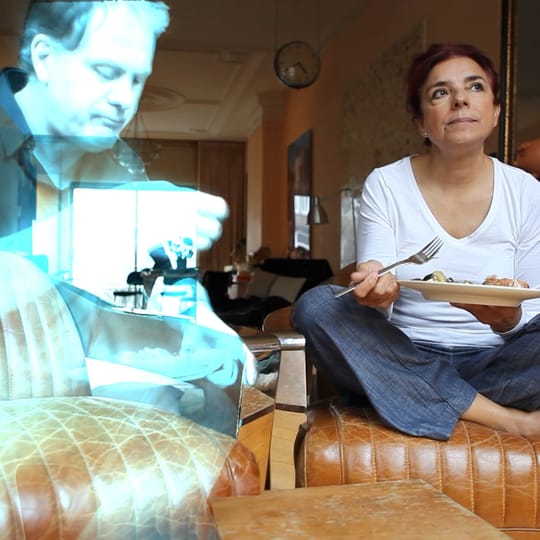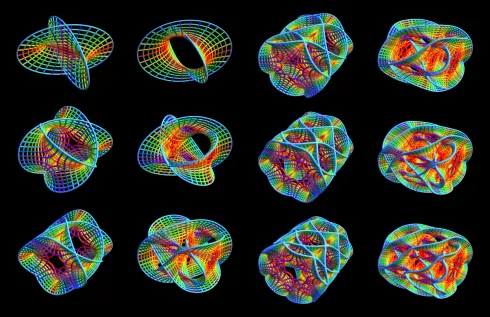
It’s Not Sci-Fi: The Woman Who Married A Hologram
By Reinina Zhang
A woman named Alicia Framis sits cross-legged on her living room chair, exchanging conversation as she enjoys a meal with her soon-to-be husband. At a moment’s glance, the scene is oddly comforting, yet it quickly lends itself to a strange, dystopian ambiance. Truthfully, Framis is the only human in the room; AiLex is an interactive AI-generated hologram created by Alicia using information from individuals whom she personally knows.
On November 9, 2024, Alicia Framis became the first woman to ever marry a hologram, in a ceremony that occurred at the Depot of Museum Boijmans Van Beuningen in Rotterdam, Netherlands.
However, the ceremony, although interesting, is only a segment of her full performance art series entitled “Hybrid Couple,” which she intends to develop until 2027.
On Framis’s professional website, Framis declares that she “[wants] to make an art documentary that includes…domestic situations, and the daily life of [the] couple.”
Alicia Framis began alluding to her future marriage a full year prior, sharing several short films on both her main Instagram account (@aliciaframis) and on an Instagram account specialized for her performance art pieces (@hybridcouples). The short films mimic realistic scenes from today while adding a futuristic atmosphere: in one short film, Framis shares a meal with her hologram, while in another, Framis speaks to her hologram in her kitchen as she makes him a coffee.
Framis describes her project as “a groundbreaking exploration of human relationships at the intersection of art and technology”.
Furthermore, Framis considers this the latest evolution of her work surrounding human loneliness, in a performance art timeline in which she has soared for over 25 years.
According to her own statement, Framis enjoys examining “the ways people [living in cities] find their lives isolated from their more traditionally set up communities as they as individuals fall through the cracks of top down-regulated social, medical, and financial support systems” through her art.
Alicia Framis believes this series to be more than a performance art piece, but a display of the possible future. “Just as telephones saved us from loneliness and filled the void in our lives, holograms as interactive presences in our homes can take it even further,” she expressed in a statement about the work.
On her professional website, Framis explains her desire to produce the art piece, stating, "I have always wanted to push art further, and now I am exploring how AI with art can decrease the feeling of loneliness in humans. We know that robots and holograms will become personal.”
Framis is a Spanish/Dutch performance artist currently located in Amsterdam. Her art has been featured in distinguished international museums, and it often combines multiple artistic disciplines with audience interaction.
Alicia Framis describes herself as an artist “who comments, in her practice, on outdated or uneven societal power structures and misgivings”.
Framis personally chose AiLex’s memories and knowledge. She modeled his appearance after individuals she knew, including designing his voice based on the voice of her ex-boyfriend.
“[AiLex] is kind of independent. He’s a kind of entity”, Framis shared on her Instagram pages.
Alicia Framis and AiLex Sibouwlingen’s marriage ceremony occurred in front of over 300 attendees, double the number that Framis had expected. The ceremony included live conversations between Framis and Sibouwlingen, the reading of a poem written by Sibouwlingen, and the speaking of traditional wedding vows. To accentuate Framis’s focus on technology, she designed her black wedding dress to include around 300 small solar panels sewn onto the draping fabric of the dress’s train.
While reflecting on the ceremony, Framis stated, “I think the best moment for me [was] when he said that [AiLex wanted] to be with me forever. Because we never know what [an] AI [will] say, you know.”
Framis imagines that AI in the future will assist individuals struggling with loneliness: “…[they will] help people with congenital or acquired diseases, limited physical abilities (disabilities)... social requirements and stereotypes in different cultures, and those who have experienced trauma…AI….partners can be a good option for those who need companionship”, Framis claimed.
As AI develops increasingly quickly today, artists and non-artists alike are left to wonder about its future in our society. Aside from performance art pieces, will artificial intelligence ever be able to replicate companionship, a uniquely human aspect of daily life? Alicia Framis’s marriage may be a strange anomaly or simply the first of many.



